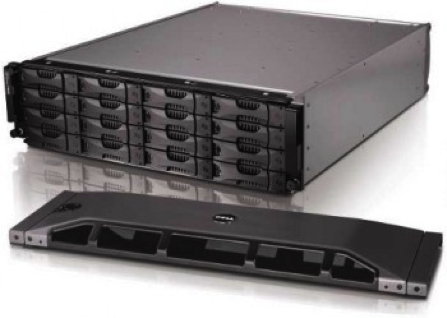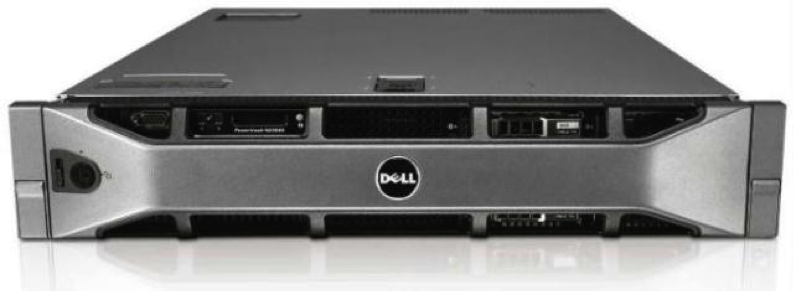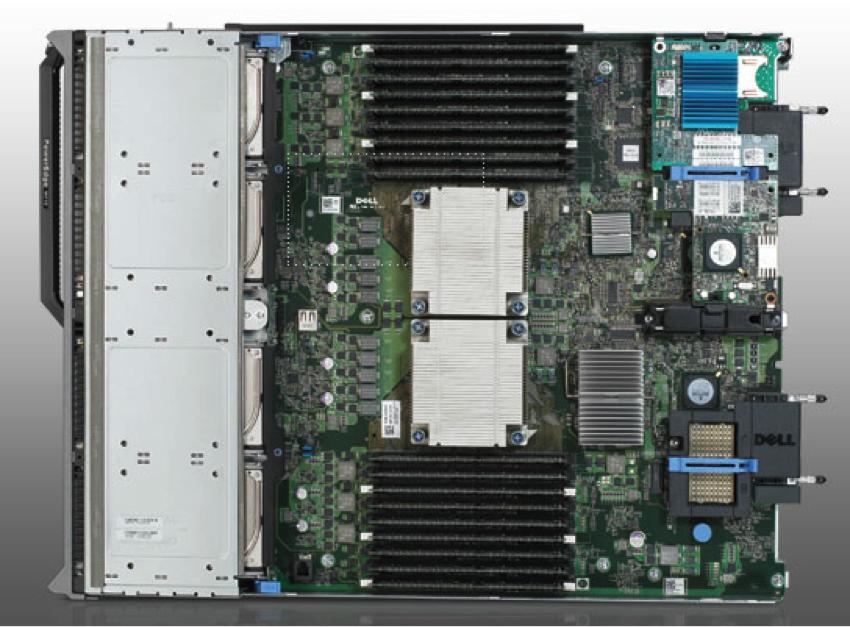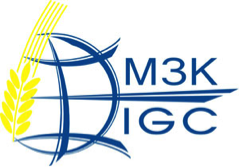The story of one modernization
Good day to all habilitam. Today we would like to tell you (of course, within the framework of what is permitted to be disclosed) about one project - the modernization of the IT infrastructure of the International Grain Company, which was provided by our partner, Server-Unit . But this time we will try as much as possible to become attached to the “reality”, and not to the tables with characteristics.
“It’s no secret that any serious company has a plan to optimize its IT infrastructure,” explains Dmitry Nechaev, a Server-Unit representative who oversaw the project, “because, as a rule, equipment manages to become obsolete both morally and functionally in five years. At the International Grain Company, the park was not updated from the very start, i.e. Already since 2004, when a dozen servers of a well-known company were sent to the “Battle Watch”. Considering that, in principle, the guarantee for such equipment does not exceed 3-5 years, it was becoming more risky to delay the issue of modernization. And a number of factors (performance, power consumption, space occupied, etc.) during this time ceased to shine with indicators. ”
An internal audit was conducted, statistics were removed, old CPUs were recalculated for new ones and much more. As a result, the updated infrastructure of the company includes:
')
• Dell EqualLogic PS6010X hard disk storage arrays with SAS and Dell EqualLogic PS6010X hard disk drives;


• Dell PowerVault NX3100 High Density Network Storage System;


• eleventh generation Dell PowerEdge M710 blade servers.


And now let's see what a real win was obtained from all this. First, virtualization. The process of buying "real glands" due to administrative costs can sometimes be delayed for several weeks. And if some server needs to be deployed "yesterday"? Here, virtualization is an undeniable plus. Secondly, financially, software for such solutions usually costs less. And if not, then sometimes you can save on the number of licenses. For example, one Windows Enterprise license will “pull” 4 virtuals.
Now the solution is a single cluster, which gives more flexibility in management. In principle, you can even steer processes from a smartphone, and it takes a little more than a minute to deploy a “virtual machine”. VMWare also automatically balances the load on the servers and, if necessary, migrates certain machines to more free hosts. Of course, not everything is so simple and not done by pressing a single button.
By the way, about food. It has also undergone modernization - it has become more intellectual. One of the virtual machines "put on" UPS, so that it monitors its autonomous operation time. If, when switching to battery power, time begins to fall into critical, it systematically (order is prescribed in advance) extinguishes less important machines, thereby leaving energy for more critical ones. If you go to some specific numbers, now the power supply "eat" 200-270 watts at the peak. That is, if there is no need, the equipment does not work at full capacity. This allowed not only to reduce energy costs, but also significantly reduce heat generation. Earlier, in a situation when the air conditioners suddenly turned off, the room heated up to 30 degrees in 10-15 minutes. Now this time has increased to 30 minutes. A few words about the availability of the system. On the old equipment, this figure was about 99-99.9%, i.e. about 2 hours of downtime per year were allowed. Now reached the level of "five nines."
Of course, it would be interesting to find out for which tasks the companies use such capacities. It turns out for the most everyday things. No super-complicated calculations or simulations. Let's take a job with databases. Their "turns" 8 pieces of 25-35 gigabytes each. It is necessary to make downloads from these databases, generate reports, etc. But only on the old "hardware" some reports were built 6-7 hours. Naturally, this time did not suit anyone. After working through the “sql-file”, we managed to reduce the time to 20 minutes. But this is if you build a report on the data for the month. And if you want to see the picture for a couple of years? Now take a look at the situation today. The annual report (which nobody used to risk generating in the past) is now prepared in 20 seconds (and this is not a typo :)). According to the administrators, before the “thin” place was not even so much the computing power as the slow “said screws”. In the new solution, the performance is provided through the use of SSD.
A few words about the interfaces. Everything is modest here. Mostly gigabit. For storage - 10 GB / s. Why not FC? The fact is that it works well when there is more output than input. Therefore, for the tasks of the International Grain Company, the administrators went through an increase in the Jumbo Frame to 9,000 bytes. As a result, after a set of measures, we managed to increase productivity by 15%.
So is it worth it? Yes, but you should not have false illusions. For example, not all equipment can be replaced. Part of the services had to be left on the old hardware (part of the telephony, protection of mail from viruses and spam, etc.). For virtualoks, it was necessary to raise 3-4 apline each, and for convenience of operation, enter about 10 more “servicing” virtual machines (see the example with UPS monitoring). Nevertheless, if you now look at the current cost of ownership of the system plus the added possibility of linearly scaling it, everything falls into place.
_______________
About Server-Unit
“It’s no secret that any serious company has a plan to optimize its IT infrastructure,” explains Dmitry Nechaev, a Server-Unit representative who oversaw the project, “because, as a rule, equipment manages to become obsolete both morally and functionally in five years. At the International Grain Company, the park was not updated from the very start, i.e. Already since 2004, when a dozen servers of a well-known company were sent to the “Battle Watch”. Considering that, in principle, the guarantee for such equipment does not exceed 3-5 years, it was becoming more risky to delay the issue of modernization. And a number of factors (performance, power consumption, space occupied, etc.) during this time ceased to shine with indicators. ”
An internal audit was conducted, statistics were removed, old CPUs were recalculated for new ones and much more. As a result, the updated infrastructure of the company includes:
')
• Dell EqualLogic PS6010X hard disk storage arrays with SAS and Dell EqualLogic PS6010X hard disk drives;


• Dell PowerVault NX3100 High Density Network Storage System;


• eleventh generation Dell PowerEdge M710 blade servers.


And now let's see what a real win was obtained from all this. First, virtualization. The process of buying "real glands" due to administrative costs can sometimes be delayed for several weeks. And if some server needs to be deployed "yesterday"? Here, virtualization is an undeniable plus. Secondly, financially, software for such solutions usually costs less. And if not, then sometimes you can save on the number of licenses. For example, one Windows Enterprise license will “pull” 4 virtuals.
Now the solution is a single cluster, which gives more flexibility in management. In principle, you can even steer processes from a smartphone, and it takes a little more than a minute to deploy a “virtual machine”. VMWare also automatically balances the load on the servers and, if necessary, migrates certain machines to more free hosts. Of course, not everything is so simple and not done by pressing a single button.
By the way, about food. It has also undergone modernization - it has become more intellectual. One of the virtual machines "put on" UPS, so that it monitors its autonomous operation time. If, when switching to battery power, time begins to fall into critical, it systematically (order is prescribed in advance) extinguishes less important machines, thereby leaving energy for more critical ones. If you go to some specific numbers, now the power supply "eat" 200-270 watts at the peak. That is, if there is no need, the equipment does not work at full capacity. This allowed not only to reduce energy costs, but also significantly reduce heat generation. Earlier, in a situation when the air conditioners suddenly turned off, the room heated up to 30 degrees in 10-15 minutes. Now this time has increased to 30 minutes. A few words about the availability of the system. On the old equipment, this figure was about 99-99.9%, i.e. about 2 hours of downtime per year were allowed. Now reached the level of "five nines."
Of course, it would be interesting to find out for which tasks the companies use such capacities. It turns out for the most everyday things. No super-complicated calculations or simulations. Let's take a job with databases. Their "turns" 8 pieces of 25-35 gigabytes each. It is necessary to make downloads from these databases, generate reports, etc. But only on the old "hardware" some reports were built 6-7 hours. Naturally, this time did not suit anyone. After working through the “sql-file”, we managed to reduce the time to 20 minutes. But this is if you build a report on the data for the month. And if you want to see the picture for a couple of years? Now take a look at the situation today. The annual report (which nobody used to risk generating in the past) is now prepared in 20 seconds (and this is not a typo :)). According to the administrators, before the “thin” place was not even so much the computing power as the slow “said screws”. In the new solution, the performance is provided through the use of SSD.
A few words about the interfaces. Everything is modest here. Mostly gigabit. For storage - 10 GB / s. Why not FC? The fact is that it works well when there is more output than input. Therefore, for the tasks of the International Grain Company, the administrators went through an increase in the Jumbo Frame to 9,000 bytes. As a result, after a set of measures, we managed to increase productivity by 15%.
So is it worth it? Yes, but you should not have false illusions. For example, not all equipment can be replaced. Part of the services had to be left on the old hardware (part of the telephony, protection of mail from viruses and spam, etc.). For virtualoks, it was necessary to raise 3-4 apline each, and for convenience of operation, enter about 10 more “servicing” virtual machines (see the example with UPS monitoring). Nevertheless, if you now look at the current cost of ownership of the system plus the added possibility of linearly scaling it, everything falls into place.
_______________
About Server-Unit

Server-Unit is a system integrator, offering its IT services on the market for more than 7 years. The company's portfolio includes hardware, software and integrated solutions for building information systems of various sizes: from entry-level server solutions to large enterprise enterprise systems.
About the International Grain Company

The company was founded in 2004 and today is the largest Russian trader in the field of export-import supplies of grain. The company provides grain to large consumers within the country, such as flour mills and feed mills. The company also supplies grain to many countries, including Greece, Iran, Egypt, Saudi Arabia, Japan and India.
Source: https://habr.com/ru/post/159463/
All Articles